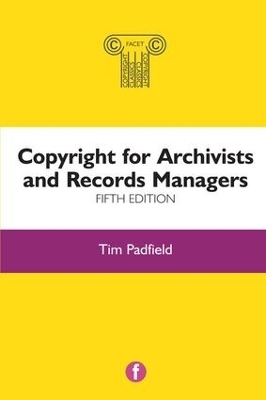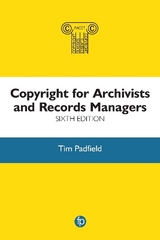
Copyright for Archivists and Records Managers, Fifth Edition
Seiten
2017
|
5th edition
Facet Publishing (Verlag)
978-1-78330-288-8 (ISBN)
Facet Publishing (Verlag)
978-1-78330-288-8 (ISBN)
- Titel erscheint in neuer Auflage
- Artikel merken
Zu diesem Artikel existiert eine Nachauflage
Extensively revised and updated, the fifth edition of this respected work uniquely outlines copyright law in the UK with special reference to materials relevant to archive and records collections.
As an archivist or records manager it is essential to keep up to date with the complexities of copyright legislation, and Copyright for Archivists and Records Managers will prove an invaluable tool in enabling you to do so. What is copyright? Who owns it and for how long? What rights does it confer, and what are the limitations and exceptions? This comprehensive manual uniquely outlines copyright law in the UK with special reference to materials relevant to archive and records collections such as maps, legal records, records of local authorities, records of churches and faiths, most notably unpublished works. It also offers advice on rights in the electronic environment and the problems associated with rights clearance; and covers related areas such as moral rights and rights in databases. The fifth edition of this respected work has been extensively revised and updated to include: a description of the major changes to copyright exceptions and limitations for libraries and archives including the changes to permit preservation copying and copying for users of any kind of work, a simplification of the declarations required from users and a new exception permitting onsite access to digital material; a description and discussion of the new schemes for orphan works; a description of the other changes to exceptions for copyright and performer’s rights, notably education; quotation; caricature, parody and pastiche; text and data mining; disability; and private copying; a revision of the views expressed on the exhibition of literary, dramatic and musical works; an explanation of why a digital photograph, consisting of a numerical file, is still an artistic work; a description of the changes in duration for sound recordings and especially for sound recordings of performances and for copyright in songs; analysis of new copyright legislation in the Channel Islands and other British overseas territories; an explanation of how national courts decide whether they have jurisdiction over the infringement of copyright on the internet; a description of changes to Crown copyright licensing and the licensing of public sector information; a new section giving links to useful websites; consideration of the many copyright cases that have come before the courts the last few years that have provided help with the interpretation of many aspects of the legislation. Some notable examples are on the meaning of ‘transient and incidental’, ‘scientific research’, ‘parody’ and ‘originality’; whether hyperlinking infringes; the importance of a signature on an assignment; the terms that may be implied into a licence; and the relationship between the rights of a copyright owner and freedom of speech. Readership: Archivists and records managers; LIS professionals in libraries, museums and galleries; students, researchers and genealogists.
As an archivist or records manager it is essential to keep up to date with the complexities of copyright legislation, and Copyright for Archivists and Records Managers will prove an invaluable tool in enabling you to do so. What is copyright? Who owns it and for how long? What rights does it confer, and what are the limitations and exceptions? This comprehensive manual uniquely outlines copyright law in the UK with special reference to materials relevant to archive and records collections such as maps, legal records, records of local authorities, records of churches and faiths, most notably unpublished works. It also offers advice on rights in the electronic environment and the problems associated with rights clearance; and covers related areas such as moral rights and rights in databases. The fifth edition of this respected work has been extensively revised and updated to include: a description of the major changes to copyright exceptions and limitations for libraries and archives including the changes to permit preservation copying and copying for users of any kind of work, a simplification of the declarations required from users and a new exception permitting onsite access to digital material; a description and discussion of the new schemes for orphan works; a description of the other changes to exceptions for copyright and performer’s rights, notably education; quotation; caricature, parody and pastiche; text and data mining; disability; and private copying; a revision of the views expressed on the exhibition of literary, dramatic and musical works; an explanation of why a digital photograph, consisting of a numerical file, is still an artistic work; a description of the changes in duration for sound recordings and especially for sound recordings of performances and for copyright in songs; analysis of new copyright legislation in the Channel Islands and other British overseas territories; an explanation of how national courts decide whether they have jurisdiction over the infringement of copyright on the internet; a description of changes to Crown copyright licensing and the licensing of public sector information; a new section giving links to useful websites; consideration of the many copyright cases that have come before the courts the last few years that have provided help with the interpretation of many aspects of the legislation. Some notable examples are on the meaning of ‘transient and incidental’, ‘scientific research’, ‘parody’ and ‘originality’; whether hyperlinking infringes; the importance of a signature on an assignment; the terms that may be implied into a licence; and the relationship between the rights of a copyright owner and freedom of speech. Readership: Archivists and records managers; LIS professionals in libraries, museums and galleries; students, researchers and genealogists.
Tim Padfield MA LLM worked at The National Archives (formerly the Public Record Office) for over thirty years before his retirement in 2013. He is a specialist in copyright, with particular reference to unpublished materials and has a postgraduate law degree, with merit. Heis a past chair of the Libraries and Archives Copyright Alliance and is adviser on copyright to the Society of Archivists, the International Council on Archives and the Bodleian Libraries.
1. What is copyright? 2. Copyright protection 3. Ownership 4. Publication, exhibition and performance 5. Use 6. Copyright in the electronic environment 7. Special cases 8. Other intellectual property rights 9. Appendix 10. Bibliography 11. Authorities
| Erscheinungsdatum | 29.10.2017 |
|---|---|
| Verlagsort | London |
| Sprache | englisch |
| Maße | 172 x 237 mm |
| Gewicht | 313 g |
| Themenwelt | Recht / Steuern ► EU / Internationales Recht |
| Recht / Steuern ► Wirtschaftsrecht ► Urheberrecht | |
| Sozialwissenschaften ► Kommunikation / Medien ► Buchhandel / Bibliothekswesen | |
| ISBN-10 | 1-78330-288-7 / 1783302887 |
| ISBN-13 | 978-1-78330-288-8 / 9781783302888 |
| Zustand | Neuware |
| Haben Sie eine Frage zum Produkt? |
Mehr entdecken
aus dem Bereich
aus dem Bereich
Gesetz gegen den unlauteren Wettbewerb, Preisangabenverordnung, …
Buch | Softcover (2024)
dtv Verlagsgesellschaft
CHF 23,65
Textausgabe zum deutschen, europäischen und internationalen Patent-, …
Buch | Softcover (2023)
dtv Verlagsgesellschaft
CHF 24,95



